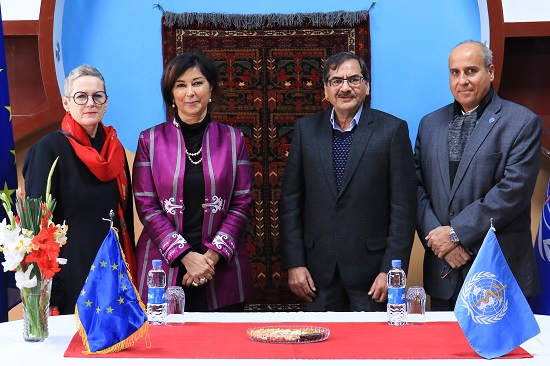 WHO and the EU renew their partnership to further support mental health service delivery in Afghanistan. Photo: WHO/Zakarya Safari. From left to right: Ms Karin Gatt-Rutter, Team Leader, Education, Health, Migration of the EU Delegation to Afghanistan; Ms Raffaella Iodice, EU Chargée d’Affaires and Deputy Head of Delegation to Afghanistan; Dr Jamshed Tanoli, Health Cluster Coordinator and Officer-in-Charge at WHO Afghanistan; and Dr Alaa Abouzeid, Health Emergency Team Lead at WHO Afghanistan
WHO and the EU renew their partnership to further support mental health service delivery in Afghanistan. Photo: WHO/Zakarya Safari. From left to right: Ms Karin Gatt-Rutter, Team Leader, Education, Health, Migration of the EU Delegation to Afghanistan; Ms Raffaella Iodice, EU Chargée d’Affaires and Deputy Head of Delegation to Afghanistan; Dr Jamshed Tanoli, Health Cluster Coordinator and Officer-in-Charge at WHO Afghanistan; and Dr Alaa Abouzeid, Health Emergency Team Lead at WHO Afghanistan
14 December 2022, Kabul, Afghanistan – The European Union has allocated €16 million towards increasing access of vulnerable populations in Afghanistan to mental health and drug use disorder services.
Drug use is usually associated with increased vulnerabilities in many areas of life, resulting in negative social and health consequences, such as co-occurring mental and physical disorders, drug-related deaths, unemployment, stigmatization, crime, and violence.
To address drug use and its related disorders in Afghanistan, World Health Organization (WHO) will increase Afghans’ access to integrated, qualitative, and comprehensive drug use disorder and mental health and psychosocial support (MHPSS) services.
“Drug use disorders need to be considered primarily as health problems rather than criminal behaviours. The EU funding will enable us to provide an effective and integrated drug treatment programme that focuses on the physical, mental, social, psychological, and economic well-being of vulnerable populations,” says Dr Luo Dapeng, WHO Representative in Afghanistan.
Raffaella Iodice, EU Chargée d’Affaires a.i. and Deputy Head of Delegation to Afghanistan: “The EU remains deeply committed to supporting the Afghan people. Too many persons in Afghanistan suffer from mental health disorders after years of conflict and political changes. Improving the health and well-being of the people of Afghanistan jointly with WHO and the United Nations Office on Drugs and Crime is to address immediate needs of people and represents concrete steps towards achieving universal health coverage”.
The EU’s assistance to Afghanistan addresses notably the most vulnerable segments of the population, including women, girls, minorities, internally displaced persons and refugees. EU aid is channelled through United Nations agencies or nongovernmental organizations.
For more information, please contact:
Joy Caminade at
Head of Communications
WHO Afghanistan
Nourhan El-Nagdy at
Donor Communication Officer
WHO Afghanistan
Tim Gillmair at
Press and Information Officer
EU Delegation to Afghanistan








